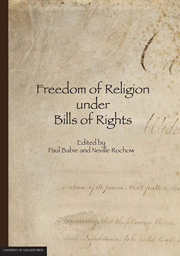Book contents
- Frontmatter
- Contents
- Acknowledgments
- List of Contributors
- Foreword by The Hon Sir Anthony Mason AC KBE: Human Rights and Courts
- INTRODUCTION
- SETTING THE SCENE
- 2 How Religion Constrains Law and the Idea of Choice
- 3 Is the Emperor Wearing the Wrong Clothes? Human Rights and Social Good in the Context of Australian Secularity: Theological Perspectives
- 4 Anniversary Overlap: Or What happens when St Paul Meets the Universal Declaration of Human Rights
- CONTEMPORARY FREEDOM OF RELIGION ISSUES
- COMPARATIVE EXPERIENCE WITH FREEDOM OF RELIGION
- TABLE OF LEGISLATION AND INTERNATIONAL INSTRUMENTS
- INDEX
2 - How Religion Constrains Law and the Idea of Choice
from SETTING THE SCENE
Published online by Cambridge University Press: 05 June 2013
- Frontmatter
- Contents
- Acknowledgments
- List of Contributors
- Foreword by The Hon Sir Anthony Mason AC KBE: Human Rights and Courts
- INTRODUCTION
- SETTING THE SCENE
- 2 How Religion Constrains Law and the Idea of Choice
- 3 Is the Emperor Wearing the Wrong Clothes? Human Rights and Social Good in the Context of Australian Secularity: Theological Perspectives
- 4 Anniversary Overlap: Or What happens when St Paul Meets the Universal Declaration of Human Rights
- CONTEMPORARY FREEDOM OF RELIGION ISSUES
- COMPARATIVE EXPERIENCE WITH FREEDOM OF RELIGION
- TABLE OF LEGISLATION AND INTERNATIONAL INSTRUMENTS
- INDEX
Summary
Render unto Caesar the things which are Caesar's, and unto God the things that are God's.
Matthew: 22In its broadest sense, this chapter is about the exercise of religious influence on and within law. Its focus is on the Christian religion and especially those parts of the Christian faithful that seek to influence law: who proselytise. Specifically, it concentrates on the ideas of the Roman Catholic Church. It considers the nature, the desirability and legitimacy of such influence, especially in the light of liberal Enlightenment principles that entail a commitment to human reason, equality and choice.
Inevitably, it begins with certain preoccupations, beliefs and presuppositions and with certain expectations. Always one needs a reason to engage with an intellectual enterprise and a set of triggering interests. Its particular interest is in the way religious believers declare their authority over some of the most fundamental human matters — life, sex and death — and seek to make law conform to their beliefs, and the degree of legal receptivity and susceptibility to these interventions. It is critical of such interventions, regarding them as constraining of human choice and against human interests, and tends to be critical of jurists who permit them. It is polemical in style: it seeks to kindle debate between the secular and the religious about the role religion does and should play in the shaping of laws, especially those that limit human choice in the most personal spheres of life.
- Type
- Chapter
- Information
- Freedom of Religion under Bills of Rights , pp. 12 - 28Publisher: The University of Adelaide PressPrint publication year: 2012

